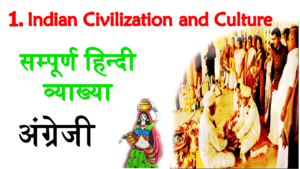इस पोस्ट में हमलोग INDIAN CIVILIZATION AND CULTURE EXPLANATION IN HINDI (भारतीय सभ्यता और संस्कृति) के प्रत्येक पंक्ति के व्याख्या को पढ़ेंगे।

INDIAN CIVILIZATION AND CULTURE (भारतीय सभ्यता और संस्कृति)
Mahatma Gandhi
MOHAN DAS KARAMCHAND GANDHI (1869-1948), popularly known as Bapu or the Father of the Nation, was more a spiritual leader than a politician. He successfully used truth and non-violence as the chief weapons against the British rule in India and helped India gain independence. From 1915 till 1948, he completely dominated Indian politics. He died at the hands of a fanatic on 30 January, 1948. His autobiography, My Experiments with Truth, and the numerous articles that he wrote for Young India and the speeches that he delivered on different occasions, reveal him not only as an original thinker but also as a great master of chaste, idiomatic English. In the following extract ‘Indian Civilization and Culture,’ Gandhiji talks about the sound foundation of Indian civilization which has successfully withstood the passage of time. The western civilization which has the tendency to privilege materiality cannot match the Indian civilization that elevates the moral being.
मोहन दास करमचंद गांधी (1869-1948), जिन्हें बापू या राष्ट्रपिता के नाम से जाना जाता है, एक राजनेता की तुलना में अधिक आध्यात्मिक नेता थे। उन्होंने भारत में ब्रिटिश शासन के खिलाफ मुख्य हथियार के रूप में सत्य और अहिंसा का सफलतापूर्वक उपयोग किया और भारत को स्वतंत्रता प्राप्त करने में मदद की। 1915 से 1948 तक वे पूरी तरह से भारतीय राजनीति पर हावी रहे। 30 जनवरी, 1948 को एक कट्टरपंथी के हाथों उनकी मृत्यु हो गई। उनकी आत्मकथा, माई एक्सपेरिमेंट्स विद ट्रुथ, और यंग इंडिया के लिए उन्होंने जो कई लेख लिखे और उनके द्वारा विभिन्न अवसरों पर दिए गए भाषणों ने उन्हें न केवल एक मूल विचारक के रूप में प्रकट किया। लेकिन पवित्र, मुहावरेदार अंग्रेजी के एक महान गुरु के रूप में भी। निम्नलिखित उद्धरण ‘भारतीय सभ्यता और संस्कृति’ में, गांधीजी भारतीय सभ्यता की ठोस नींव के बारे में बात करते हैं, जिसने सफलतापूर्वक समय बीतने का सामना किया है। पश्चिमी सभ्यता जिसमें भौतिकता को विशेषाधिकार देने की प्रवृत्ति है, वह भारतीय सभ्यता से मेल नहीं खा सकती है जो नैतिक अस्तित्व को बढ़ाती है।
INDIAN CIVILIZATION AND CULTURE (भारतीय सभ्यता और संस्कृति)
1. I believe that the civilization India has devolved is not to be beaten in the world. Nothing can equal the seeds sown by our ancestors. Rome went, Greece shared the same fate, the might of the Pharaohs was broken, Japan has become westernized; of China nothing can be said, but India is still, somehow or other, sound at the foundation. The people of Europe learn their lessons from the writings of the men of Greece or Rome which exist no longer in their former glory. In trying to learn from them, the Europeans imagine that they will avoid the mistakes of Greece and Rome. Such is their pitiable condition.
1. मेरा मानना है कि भारत ने जो सभ्यता विकसित की है, उसे दुनिया में पिटना नहीं है। हमारे पूर्वजों द्वारा बोए गए बीजों की बराबरी कोई नहीं कर सकता। रोम चला गया, ग्रीस ने वही भाग्य साझा किया, फिरौन की ताकत टूट गई, जापान पश्चिमीकरण हो गया; चीन के बारे में कुछ नहीं कहा जा सकता है, लेकिन भारत अभी भी, किसी न किसी तरह, नींव पर मजबूत है। यूरोप के लोग ग्रीस या रोम के लोगों के लेखन से अपना सबक सीखते हैं जो अब उनके पूर्व गौरव में मौजूद नहीं हैं। उनसे सीखने की कोशिश में, यूरोपीय लोग कल्पना करते हैं कि वे ग्रीस और रोम की गलतियों से बचेंगे। यह उनकी दयनीय स्थिति है।
2. In the midst of all this, India remains immovable and that is her glory. It is a charge against India that her people are so uncivilized, ignorant and stolid, that it is not possible to induce them to adopt any changes. It is a charge really against our merit. What we have tested and found true on the anvil of experience, we dare not change. Many thrust their advice upon India, and she remains steady. This is her beauty; it is the sheet anchor of our hope.
2. इन सबके बीच भारत अचल रहता है और यही उसकी महिमा है। यह भारत के खिलाफ आरोप है कि उसके लोग इतने असभ्य, अज्ञानी और अडिग हैं, कि उन्हें किसी भी बदलाव को अपनाने के लिए प्रेरित करना संभव नहीं है। यह वास्तव में हमारी योग्यता के खिलाफ आरोप है। हमने अनुभव के आधार पर जो परीक्षण किया है और सच पाया है, उसे बदलने की हिम्मत नहीं है। कई लोग अपनी सलाह भारत पर थोपते हैं, और वह स्थिर रहती है। यह उसकी सुंदरता है; यह हमारी आशा का चादर लंगर है।
3. Civilization is that mode of conduct which points out to man the path of duty. Performance of duty and observance of morality are convertible terms. To observe morality is to attain mastery over our minds and our passions. So doing, we know ourselves. The Gujarati equivalent for civilization means “good conduct”.
3. सभ्यता आचरण का वह तरीका है जो मनुष्य को कर्तव्य का मार्ग बताता है। कर्तव्य का पालन और नैतिकता का पालन परिवर्तनीय शब्द हैं। नैतिकता का पालन करना हमारे मन और हमारे जुनून पर महारत हासिल करना है। ऐसा करते हुए, हम खुद को जानते हैं। सभ्यता के लिए गुजराती समकक्ष का अर्थ है “अच्छे आचरण”।
4. If this definition be correct, then India, as so many writers have shown, has nothing to learn from anybody else, and this is as it should be.
4. यदि यह परिभाषा सही है, तो भारत, जैसा कि कई लेखकों ने दिखाया है, किसी और से सीखने के लिए कुछ नहीं है, और यह वैसा ही होना चाहिए जैसा होना चाहिए।
5. We notice that the mind is a restless bird, the more it gets the more it wants, and still remains unsatisfied. The more we indulge in our passions, the more unbridled they become. Our ancestors, therefore, set a limit to our indulgences. They saw that happiness was largely a mental condition.
5. हम देखते हैं कि मन एक बेचैन पक्षी है, जितना अधिक चाहता है उतना ही अधिक प्राप्त करता है, और फिर भी असंतुष्ट रहता है। जितना अधिक हम अपने जुनून में लिप्त होते हैं, वे उतने ही बेलगाम होते जाते हैं। इसलिए, हमारे पूर्वजों ने हमारे भोगों की एक सीमा निर्धारित की। उन्होंने देखा कि खुशी काफी हद तक एक मानसिक स्थिति थी।
Bihar board Class 12th English Chapter 1 Indian civilization and culture explanation in hindi
6. A man is not necessarily happy because he is rich, or unhappy because he is poor. The rich are often seen to be unhappy, the poor to be happy. Millions will always remain poor. Observing all this, our ancestors dissuaded us from luxuries and pleasures. We have managed with the same kind of plough as existed thousands of years ago. We have retained the same kind of cottages that we had in former times and our indigenous education remains the same as before. We have had no system of life corroding competition. Each followed his own occupation or trade and charged a regular wage. It was not that we did not know how to invent machinery, but our forefathers knew that, if we set our hearts after such things, we would become slaves and lose our moral fibre. They, therefore, after due deliberation decided that we should only do what we could with our hands and feet. They saw that our real happiness and health consisted in a proper use of our hands and feet.
एक आदमी जरूरी इसलिए खुश नहीं है क्योंकि वह अमीर है, या दुखी है क्योंकि वह गरीब है। अमीरों को अक्सर दुखी देखा जाता है, गरीबों को खुश देखा जाता है। लाखों हमेशा गरीब रहेंगे। यह सब देखकर हमारे पूर्वजों ने हमें विलासिता और सुखों से दूर किया। हम उसी तरह के हल से काम चला रहे हैं जो हजारों साल पहले हुआ करता था। हमने उसी तरह के कॉटेज को बरकरार रखा है जो हमारे पास पूर्व समय में थे और हमारी स्वदेशी शिक्षा पहले की तरह ही बनी हुई है। हमारे पास जीवन संक्षारक प्रतिस्पर्धा की कोई व्यवस्था नहीं है। प्रत्येक अपने स्वयं के व्यवसाय या व्यापार का पालन करता था और नियमित मजदूरी लेता था। ऐसा नहीं था कि हम मशीनरी का आविष्कार करना नहीं जानते थे, लेकिन हमारे पूर्वजों को पता था कि अगर हम इस तरह की चीजों के लिए अपना दिल लगाते हैं, तो हम गुलाम बन जाएंगे और अपना नैतिक फाइबर खो देंगे। इसलिए, उन्होंने विचार-विमर्श के बाद फैसला किया कि हमें केवल वही करना चाहिए जो हम अपने हाथों और पैरों से कर सकते हैं। उन्होंने देखा कि हमारा वास्तविक सुख और स्वास्थ्य हमारे हाथों और पैरों के उचित उपयोग में निहित है।
7. They further reasoned that large cities were a snare and a useless encumbrance and that people would not be happy in them, that there would be gangs of thieves and robbers, prostitution and vice flourishing in them and that poor men would be robbed by rich men. They were, therefore, satisfied with small villages.
उन्होंने आगे तर्क दिया कि बड़े शहर एक फंदा और एक बेकार बोझ थे और लोग उनमें खुश नहीं होंगे, कि चोरों और लुटेरों के गिरोह होंगे, वेश्यावृत्ति और बुराई फल-फूल रही होगी और अमीर लोगों द्वारा गरीब पुरुषों को लूट लिया जाएगा। इसलिए, वे छोटे गांवों से संतुष्ट थे।
8. They saw that kings and their swords were inferior to the sword of ethics, and they, therefore, held the sovereigns of the earth to be inferior to the Rishis and the Fakirs. A nation, with a constitution like this, is fitter to teach others than to learn from others. This nation had courts, lawyers and doctors, but they were all within bounds. Everybody knew that these professions were not particularly superior. Moreover, these Vakils and Vaids did not rob people; they were considered people’s dependents, not their masters. Justice was tolerably fair. The ordinary rule was to avoid courts. There were no touts to lure people into them. This evil too was noticeable only in and around capitals. The common people lived independently and followed their agricultural occupation. They enjoyed true Home Rule.
8. उन्होंने देखा कि राजा और उनकी तलवारें नैतिकता की तलवार से नीच हैं, और इसलिए, उन्होंने पृथ्वी के शासकों को ऋषियों और फकीरों से कमतर माना। इस तरह के संविधान वाला एक राष्ट्र दूसरों से सीखने की तुलना में दूसरों को सिखाने के लिए अधिक उपयुक्त है। इस देश में अदालतें, वकील और डॉक्टर थे, लेकिन वे सभी सीमा के भीतर थे। हर कोई जानता था कि ये पेशे विशेष रूप से श्रेष्ठ नहीं थे। इसके अलावा, इन वकीलों और वैद्यों ने लोगों को नहीं लूटा; उन्हें लोगों का आश्रित माना जाता था, उनका स्वामी नहीं। न्याय सहनीय रूप से निष्पक्ष था। सामान्य नियम अदालतों से बचना था। लोगों को अपनी ओर आकर्षित करने के लिए कोई दलाल नहीं थे। यह बुराई भी केवल राजधानियों और उसके आसपास ही ध्यान देने योग्य थी। आम लोग स्वतंत्र रूप से रहते थे और अपने कृषि व्यवसाय का पालन करते थे। उन्होंने सच्चे होम रूल का आनंद लिया।
9. The Indian civilization, as described by me, has been so described by its votaries. In no part of the world, and under no civilization, have all men attained perfection. The tendency of Indian civilizations is to elevate the moral being, that of the western civilization is to propagate immorality. The latter is godless; the former is based on a belief in God. So understanding and so believing, it behoves every lover of India to cling to the old Indian civilization even as a child clings to the mother’s breast.
मेरे द्वारा वर्णित भारतीय सभ्यता का वर्णन उसके समर्थकों द्वारा किया गया है। दुनिया के किसी भी हिस्से में, और किसी भी सभ्यता के तहत, सभी पुरुषों ने पूर्णता प्राप्त नहीं की है। भारतीय सभ्यताओं की प्रवृत्ति नैतिक सत्ता को ऊपर उठाने की है, पश्चिमी सभ्यता की प्रवृत्ति अनैतिकता का प्रचार करने की है। बाद वाला ईश्वरविहीन है; पूर्व भगवान में विश्वास पर आधारित है। इतना समझदार और इतना विश्वास करने वाला, यह भारत के हर प्रेमी को पुरानी भारतीय सभ्यता से चिपके रहने का व्यवहार करता है, जैसे कि एक बच्चा माँ के स्तन से चिपक जाता है।
10. I am no hater of the West. I am thankful to the West for many a thing I have learnt from Western literature. But I am thankful to modern civilization for teaching me that if I want India to rise to its fullest height, I must tell my countrymen frankly that, after years and years of experience of modern civilization, I have learnt one lesson from it and that is that we must shun it at all costs.
मुझे पश्चिम से कोई नफरत नहीं है। पश्चिमी साहित्य से मैंने जो कुछ सीखा है, उसके लिए मैं पश्चिम का शुक्रगुजार हूं। लेकिन मैं आधुनिक सभ्यता का शुक्रगुजार हूं कि उसने मुझे यह सिखाया कि अगर मैं चाहता हूं कि भारत अपनी पूरी ऊंचाई तक पहुंचे, तो मुझे अपने देशवासियों को स्पष्ट रूप से बताना होगा कि आधुनिक सभ्यता के वर्षों और वर्षों के अनुभव के बाद, मैंने इससे एक सबक सीखा है और वह है कि हमें इसका हर कीमत पर बहिष्कार करना चाहिए।
Bihar board Class 12th English Chapter 1 Indian civilization and culture explanation in hindi
11. What is that modern civilization? It is the worship of the material, it is the worship of the brute in us, it is unadulterated materialism, and modern civilization is nothing if it does not think at every step of the triumph of material civilization.
वह आधुनिक सभ्यता क्या है? यह भौतिक की पूजा है, यह हम में पशु की पूजा है, यह शुद्ध भौतिकवाद है, और आधुनिक सभ्यता कुछ भी नहीं है अगर यह भौतिक सभ्यता की विजय के हर कदम पर नहीं सोचती है।
12. It is perhaps unnecessary, if not useless, to weigh the merits of the two civilizations. It is likely that the West has evolved a civilization suited to its climate and surroundings, and similarly, we have a civilization suited to our conditions, and both are good in their own respective spheres.
दो सभ्यताओं के गुणों को तौलना, यदि बेकार नहीं तो शायद अनावश्यक है। यह संभावना है कि पश्चिम ने अपनी जलवायु और परिवेश के अनुकूल सभ्यता विकसित की है, और इसी तरह, हमारे पास हमारी परिस्थितियों के अनुकूल सभ्यता है, और दोनों अपने-अपने क्षेत्रों में अच्छे हैं।
13. The distinguishing characteristic of modern civilization is an indefinite multiplicity of human wants. The characteristic of ancient civilization is an imperative restriction upon, and a strict regulating of, these wants. The modern or western insatiableness arises really from want of living faith in a future state and therefore also in Divinity. The restraint of ancient or Eastern civilization arises from a belief, often in spite of ourselves, in a future state and the existence of a Divine Power.
आधुनिक सभ्यता की विशिष्ट विशेषता मानव आवश्यकताओं की अनिश्चित बहुलता है। प्राचीन सभ्यता की विशेषता इन आवश्यकताओं पर एक अनिवार्य प्रतिबंध और एक सख्त विनियमन है। आधुनिक या पश्चिमी अतृप्ति वास्तव में भविष्य की स्थिति में और इसलिए देवत्व में भी विश्वास की कमी से उत्पन्न होती है। प्राचीन या पूर्वी सभ्यता का संयम एक विश्वास से उत्पन्न होता है, अक्सर स्वयं के बावजूद, भविष्य की स्थिति में और एक दैवीय शक्ति के अस्तित्व में।
14. Some of the immediate and brilliant results of modern inventions are too maddening to resist. But I have no manner of doubt that the victory of man lies in that résistance. We are in danger of bartering away the permanent good for a momentary pleasure.
आधुनिक आविष्कारों के कुछ तात्कालिक और शानदार परिणाम विरोध करने के लिए बहुत परेशान हैं। लेकिन मुझे इसमें कोई संदेह नहीं है कि मनुष्य की जीत उस प्रतिरोध में निहित है। हम क्षणिक सुख के लिए स्थायी अच्छाई को दूर करने के खतरे में हैं।
15. Just as in the West they have made wonderful discoveries in things material, similarly Hinduism has made still more marvellous discoveries in things of religion, of the spirit, of the soul.
जिस प्रकार पश्चिम में उन्होंने भौतिक वस्तुओं में अद्भुत खोज की है, उसी प्रकार हिंदू धर्म ने धर्म, आत्मा, आत्मा की चीजों में और भी अद्भुत खोज की है।
Bihar board Class 12th English Chapter 1 Indian civilization and culture explanation in hindi
16. But we have no eye for these great and fine discoveries. We are dazzled by the material progress that Western science has made. I am not enamoured of that progress. In fact, it almost seems as though God in His wisdom has prevented India from progressing along those lines, so that it might fulfil its special mission of resisting the onrush of materialism.
. लेकिन इन महान और बेहतरीन खोजों पर हमारी कोई नजर नहीं है। पश्चिमी विज्ञान ने जो भौतिक प्रगति की है, उससे हम चकित हैं। मुझे उस प्रगति का मोह नहीं है। वास्तव में, ऐसा लगता है जैसे ईश्वर ने अपनी बुद्धि में भारत को उस दिशा में आगे बढ़ने से रोक दिया है, ताकि वह भौतिकवाद के हमले का विरोध करने के अपने विशेष मिशन को पूरा कर सके।
17. After all, there is something in Hinduism that has kept it alive up till now. It has witnessed the fall of Babylonian, Syrian, Persian and Egyptian civilizations. Cast a look around you. Where is Rome and where is Greece? Can you find today anywhere the Italy of Gibbon, or rather the ancient Rome, for Rome was Italy?
आखिर हिंदू धर्म में कुछ ऐसा है जिसने इसे अब तक जिंदा रखा है। इसने बेबीलोनियाई, सीरियाई, फारसी और मिस्र की सभ्यताओं का पतन देखा है। अपने चारों ओर एक नज़र डालें। रोम कहाँ है और ग्रीस कहाँ है? क्या आप आज कहीं भी गिब्बन का इटली या प्राचीन रोम ढूंढ सकते हैं, क्योंकि रोम इटली था?
18. Go to Greece. Where is the world-famous Attic civilization? Then coming to India, let one go through the most ancient records and then look around you and you would be constrained to say, “yes, I see here ancient India still living”.
ग्रीस जाओ। विश्व प्रसिद्ध अटारी सभ्यता कहाँ है? फिर भारत आकर, सबसे प्राचीन अभिलेखों को देखें और फिर अपने चारों ओर देखें और आप कहने के लिए विवश होंगे, “हाँ, मैं यहाँ प्राचीन भारत को अभी भी जीवित देख रहा हूँ”।
19. True, there were dungheaps, too, here and there, but there are rich treasures buried under them. And the reason why it has survived is that the end which Hinduism set before it was not development along material but spiritual lines.
सच है, कूड़ाकरकट भी इधर-उधर था, परन्तु उसके नीचे बहुत धन छिपा है। और इसके जीवित रहने का कारण यह है कि हिंदू धर्म ने जिस लक्ष्य को अपने सामने रखा है, वह भौतिक विकास नहीं बल्कि आध्यात्मिक आधार पर था।
20. Our civilization, our culture, our Swaraj depend not upon multiplying our wants self-indulgence, but upon restricting wants – self denial.
हमारी सभ्यता, हमारी संस्कृति, हमारा स्वराज हमारी इच्छाओं को बढ़ाने पर निर्भर नहीं करता है, बल्कि इच्छाओं को सीमित करने पर निर्भर करता है – आत्म इनकार।
Bihar board Class 12th English Chapter 1 Indian civilization and culture explanation in hindi
21. European civilization is, no doubt, suited for the Europeans but it will mean ruin for India if we endeavour to copy it. This is not to say that we may not adopt and assimilate whatever may be good and capable of assimilation by us, as it does not also mean that even the Europeans will not have to part with whatever evil might have crept into it.
निस्संदेह, यूरोपीय सभ्यता यूरोपीय लोगों के लिए उपयुक्त है, लेकिन अगर हम इसकी नकल करने का प्रयास करते हैं तो इसका मतलब भारत के लिए बर्बादी होगा। इसका मतलब यह नहीं है कि हम जो कुछ भी अच्छा और आत्मसात करने में सक्षम हो, उसे हम स्वीकार और आत्मसात नहीं कर सकते, क्योंकि इसका मतलब यह भी नहीं है कि यूरोपीय लोगों को भी इसमें शामिल होने वाली बुराई से अलग नहीं होना पड़ेगा।
22. The incessant search for material comforts and their multiplication is such an evil and I make bold to say that the Europeans themselves will have to remodel their outlook, if they are not to perish under the weight of the comforts to which they are becoming slaves. It may be that my reading is wrong, but I know that for India to run after the Golden Fleece is to court certain death. Let us engrave on our hearts the motto of a Western philosopher: “Plain living and high thinking”. Today it is certain that the millions cannot have high living and we the few, who profess to do the thinking for the masses, run the risk, in a vain search after high living, of missing high thinking.
भौतिक सुख-सुविधाओं की निरंतर खोज और उनका गुणन एक ऐसी बुराई है और मैं यह कहने का साहस करता हूं कि यूरोपीय लोगों को स्वयं अपने दृष्टिकोण को फिर से तैयार करना होगा, यदि वे उन सुख-सुविधाओं के बोझ के नीचे नष्ट नहीं होंगे, जिनके वे गुलाम बन रहे हैं। . हो सकता है कि मेरा पढ़ना गलत हो, लेकिन मैं जानता हूं कि भारत के लिए सोने की ऊन के पीछे दौड़ना निश्चित मौत है। आइए हम अपने दिलों पर एक पश्चिमी दार्शनिक के आदर्श वाक्य को उकेरें: “सादा जीवन और उच्च विचार”। आज यह निश्चित है कि लाखों लोगों के पास उच्च जीवन नहीं हो सकता है और हम कुछ, जो जनता के लिए सोचने का दावा करते हैं, उच्च जीवन की व्यर्थ खोज में, उच्च सोच को खोने का जोखिम उठाते हैं।
23. Civilization, in the real sense of the term, consists not in the multiplication, but in the deliberate and voluntary restriction of wants. This alone increases and promotes contentment, real happiness and capacity for service.
सभ्यता, शब्द के वास्तविक अर्थों में, गुणन में नहीं, बल्कि इच्छा के जानबूझकर और स्वैच्छिक प्रतिबंध में शामिल है। यह अकेले संतोष, वास्तविक खुशी और सेवा की क्षमता को बढ़ाता है और बढ़ावा देता है।
24. A certain degree of physical harmony and comfort is necessary but above a certain level it becomes a hindrance instead of help. Therefore, the ideal of creating an unlimited number of wants and satisfying them seems to be a delusion and a snare. The satisfaction of one’s physical needs, even the intellectual needs of one’s narrow self, must meet at a certain point a dead stop, before it degenerates into physical and intellectual voluptuousness. A man must arrange his physical and cultural circumstances so that they do not hinder him in his service of humanity on which all his energies should be concentrated.
कुछ हद तक शारीरिक सामंजस्य और आराम आवश्यक है लेकिन एक निश्चित स्तर से ऊपर यह मदद के बजाय एक बाधा बन जाता है। इसलिए असीमित संख्या में इच्छाएं पैदा करने और उन्हें संतुष्ट करने का आदर्श एक भ्रम और एक फंदा प्रतीत होता है। शारीरिक और बौद्धिक कामुकता में बदलने से पहले, किसी की शारीरिक जरूरतों की संतुष्टि, यहां तक कि अपने संकीर्ण आत्म की बौद्धिक जरूरतों को भी, एक निश्चित बिंदु पर एक मृत पड़ाव मिलना चाहिए। एक व्यक्ति को अपनी भौतिक और सांस्कृतिक परिस्थितियों को व्यवस्थित करना चाहिए ताकि वे उसे मानवता की सेवा में बाधा न डालें, जिस पर उसकी सारी ऊर्जा केंद्रित होनी चाहिए।
Rainbow part 2 English Chapter 1 Indian civilization and culture explanation in hindi
Read More – Click here
Class 10th Ncert Sanskrit – Click here
YouTube Video – Click here



